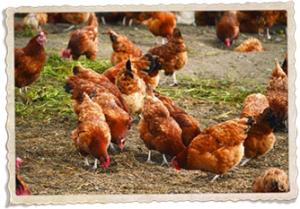Have you ever wondered what your chickens are saying with their clucks, crows, and squawks? It turns out there’s a whole lot of communication going on in your backyard flock. In fact, researchers have identified more than 24 distinct vocalizations in chicken language. Let’s dive into the fascinating world of chicken communication.
A Chicken’s Vocabulary
Chickens have a surprisingly rich vocabulary. From clucks and crows to squawks and purrs, each sound has a unique meaning. Here are some common ones:
- The Food Call: This is a series of excited and quick clucks, often made by a rooster to alert hens to a food source. Hens can make the same sound, but it’s most commonly associated with roosters.
- The Warning Call: This is a sharp, loud, and high-pitched sound. Chickens make this call when they spot a potential predator. The type of call can vary depending on whether the threat is from the ground or the sky.
- Brooding Sounds: Hens make soft, rhythmic clucking sounds when they’re sitting on eggs. These sounds continue after the chicks hatch and are believed to soothe the chicks and build a bond.
The Meaning Behind the Crow
Most people associate chickens, particularly roosters, with crowing. Roosters crow for a variety of reasons. Some crows signify the break of dawn, serving as a kind of wake-up call for the flock. Others are territorial signals, warning other roosters to stay away. Interestingly, younger roosters usually wait for the dominant rooster to crow first before they begin.
Understanding Chicken Body Language
Communication isn’t just vocal for chickens – body language plays a huge part. Chickens puff up their feathers to show dominance, lay their feathers flat in submission, and a slow, low wing flap often serves as a rooster’s courtship display. By observing these behaviors, you can gain insights into your flock’s social dynamics.
Applying Your Knowledge
Understanding your chickens’ communication can be beneficial in many ways:
- Enhanced Care: By responding promptly to warning calls, you can better protect your flock from potential threats.
- Improved Health Monitoring: Changes in vocalization or behavior often signal health problems. Identifying these signs early can lead to more effective treatment.
- Greater Connection: The more you understand your chickens, the stronger your bond becomes. It’s satisfying to know you’re part of the conversation, even if you’re just listening!
The world of chicken communication is far richer and more complex than most people realize. By taking the time to understand their clucks, crows, and body language, you can enhance the care you provide, deepen your connection to your flock, and gain a greater appreciation for these remarkable birds.
Whether you’re a seasoned chicken keeper or just starting out, Chickens for Backyards is here to help. Look through our website to get started!

